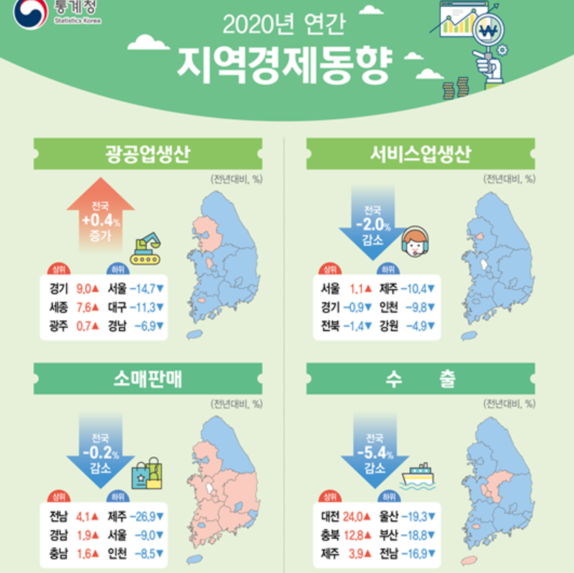Input 2021.02.22 12:00
According to the regional economic trends for the fourth quarter of 2020 and annual regional economic trends released by the National Statistical Office on the 22nd, last year, Jeju’s service industry production decreased by 10.4% and retail sales by 26.9% compared to the previous year. When the annual national average retail sales decreased by 0.2% and service industry production decreased by 2.0%, it was found that the national average was hit harder.

Last year, most attempts, including Jeju, were hit by Corona 19 last year. In particular, production in the service industry decreased by 2% on a national basis. In Incheon (-9.8%) and Gangwon (-4.9%), production in the service industry decreased as production of accommodation, restaurants, transportation and warehouses, arts, sports, and leisure decreased. Seoul increased 1.1%, mainly in finance, insurance, and real estate.
During this period, retail sales decreased by 0.2% on a national basis, but decreased in Seoul (-9.0%) and Incheon (-8.5%) as sales declined due to the sluggish duty-free and specialized retail stores. In Jeonnam (4.1%), Gyeongnam (1.9%), and Chungnam (1.6%), sales of passenger cars, fuel retail stores, supermarkets and convenience stores increased.
Mining and industrial production increased by 0.4% compared to the previous year as production of semiconductors and machinery equipment increased on a national basis. Seoul (-14.7%), Daegu (-11.3%), and Gyeongnam (-6.9%) decreased as production of clothing, fur, machinery and other transportation equipment decreased. On the other hand, in Gyeonggi (9.0%), Sejong (7.6%), and Gwangju (0.7%), production of electronic parts, semiconductors, and electrical equipment increased.
Exports decreased by 5.4% compared to the previous year as exports of other petroleum products, diesel, and other general machinery decreased on a national basis. Exports of other petroleum products and passenger cars were sluggish in cities and provinces with traditional industries such as Ulsan (-19.3%), Busan (-18.8%), and Jeonnam (-16.9%).
On the other hand, Daejeon (24.0%), Chungbuk (12.8%), and Jeju (3.9%) increased mainly in integrated circuit semiconductors, computer peripherals, and food and beverage consumer goods.
Retail sales in the fourth quarter decreased 1.3% from the same quarter last year as sales at specialized retail stores and duty-free stores all over the country declined. During this period, Jeju (-32.7%), Seoul (-11.7%), and Incheon (-10.2%) were sluggish as sales of duty-free shops and specialized retail stores declined. Gyeonggi (0.6%) and Gyeongnam (0.5%) showed an increase in sales of passenger cars, fuel retail stores, and hypermarkets.
During this period, mining and industrial production increased by 0.6% from the same period of the previous year on a national basis, with only 4 cities and provinces including Sejong (10.8%) and Gwangju (9.1%), and Seoul (-10.8%) and Busan (-9.4%). Thirteen cities and provinces declined. Service industry production declined by 2% on a national basis. 15 cities, including Incheon (-11.5%) and Jeju (-9.4%), decreased, and Seoul (0.9%) increased.
